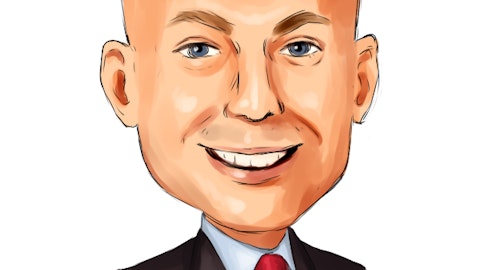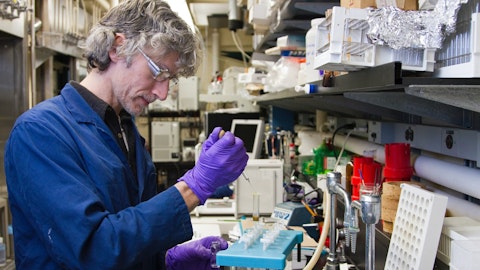Sergio Traversa: Yes. I will let Dr. Fava to answer that question. From my perspective, clearly additional training is needed for these sites and then faster enrollment. These sites are sites that — we call them commercial sites, but they enroll patient as a base of their business, so they are not hospitals or clinics. So they are pure like the size of enrolled patients for clinical trials. And pretty much all the patients that they enrolled have been enrolled coming from social media advertising. So when you enroll a lot of patients, you enroll fast. And sometimes the diagnosis is done a little bit on the cost side. But I’ll let Dr. Fava, he’s really the expert on this, cover more in detail. Maurizio?
Maurizio Fava: Yes. No, it’s a great question. I think that — I’m not certain necessarily that the fault was in the assessment. Again, we need to consider the population that we were trying to enroll. The study specifically looked for people untreated with major acute depressive episodes in the midst of a pandemic and recruited primarily through advertisement So if I am already an existing patient, I have my doctor, if I have a recurrence of my depression. I go to my doctor. I go back to the medicines I’ve tried before. But if I’ve never been treated before, I may respond to an ad. I may look at a study. So whenever you’re doing a study that specifically looks for people who have never been treated before, who have developed symptoms acutely, don’t have chronic or recurrent depression.
And therefore, you don’t know that, at least in prior episodes, have shown that they’ve responded only to medicines. You’re likely to have what we call abnormal placebo responses. And the abnormal placebo responses are due to spontaneous remissions that may have happened at any point during the study. So the same site that may have performed terribly by enrolling these people who have depression but not recurrent — remember, we did not ask for chronic or recurrent depression. We asked for acute depression in untreated patients who are not treated by anybody. So you’re looking for the best-case scenario of someone who, in some ways, is very likely to respond to the first therapeutic intervention that they receive, just interacting with people, getting out of the house during the pandemic, et cetera.
Whereas in the other study, we’re taking people who are in treatment, who are currently engaged, who are likely to have either chronic or recurrent depression. So it’s like a different disease altogether. And so I don’t know if I would predict that the same size that performed badly on the monotherapy trial are going to perform badly on the augmentation study because it’s two different populations, and the referral process is very different. I don’t know if that addresses your question, Andrea.
Andrea Tan: Yes. That was really helpful. As a follow-up there, I guess, to what extent do you believe the SAFER interview should have been able to maybe mitigate some of those issues or caught people that maybe were not appropriately enrolled in the trial? Or is that just the nature of the different patient populations that you’re referring to, that you really can’t rely on the SAFER interview?
Maurizio Fava: Yes. I think that —
Sergio Traversa: Dr. Fava, it’s really for you.
Maurizio Fava: I’m pretty confident that for the SAFER would clearly protect you from high placebo response rates in patients who are currently treated. In patients who are untreated, the — normally, a SAFER interview determines what medicines you’re on, how the — is the treatment adequate? What’s the treatment history? How many times have you been diagnosed, et cetera, et cetera. So the interview gives a sense of the course of illness and the confidence that you’re dealing with a patient with a real disease. In a monotherapy trial with acute episode, the question — there’s no question about treatment, because there’s no treatment history. There’s no question about course of illness, because there’s no requirement to chronic or recurrent.


